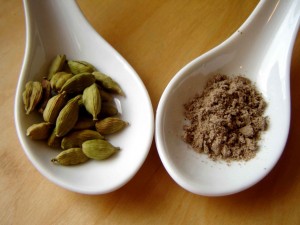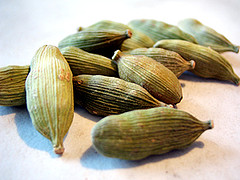
You’re biting into a rice dish or a dessert at an Indian restaurant and your tongue encounters an unfamiliar object. It’s a light green three sided pod with a thin outer cover and some black seeds inside. This delightfully aromatic spice is cardamom. Found in seed, or pod, and powder form, cardamom’s camphor like flavor leaves an indelible impression on the taste buds.
Known in Hindi as ilaichi, cardamom has a sweet and pungent initial taste or rasa, is heating, and has a pungent after-taste. In terms of Ayurveda, cardamom increases Pitta dosha and decreases Vata and Kapha. Sattvic in nature, this aromatic herb removes Kapha from the stomach and the lungs. It is a heart tonic and an expectorant for respiratory diseases. You may learn your current Ayurvedic constitution by taking this free quiz.
A study in India found that oral administration of cardamom helped inhibit cell growth and proliferation, and even caused cell death, in human colon cancer cells.
Another study performed in India showed that oral consumption of 3 g (or 0.1 oz) of cardamom daily for three months significantly lowered both systolic and diastolic blood pressure in patients who were recently diagnosed with hypertension.
Native to Southern India, cardamom is part of the Zingiberaceae (ginger) botanical family and consists of two types: Elletaria and Amomum cardamomum. Elettaria pods are small and light green, while the amomum pods are larger and dark brown. Cardamom is an essential spice in chai mixes. It is also found in Ayurvedic toothpaste.

Scientific evidence shows that cardamom contains components which protect and prevent blood clots from clumping in the blood stream.
Furthermore, scientific analysis has found that cardamom is a wonderful dietary source of limonene, a chemical primarily found in the skin of citrus fruits. And a Brazilian study performed revealed that consumption of limonene boosted antioxidant activity.
In Ayurvedic terms, cardamom kindles the agni, or digestive fire. Taken after a meal, cardamom improves digestion and freshens the breath.
HOME REMEDIES UTILIZING CARDAMOM
- For cough and breathlessness, take a pinch of cardamom powder, a pinch of mineral salt, 1 tsp of ghee, and ½ tsp of raw, uncooked honey mixed together.
- Cardamom works as a diuretic. To alleviate burning urination, take 1 pinch of cardamom powder with ½ cup of cucumber juice twice daily.
- To help bleeding disorders, take a pinch each of cardamom, saffron, and nutmeg, mixed with ½ tsp of raw, uncooked honey and 1 tsp of aloe vera juice twice a day.
- For nausea, take 2 pinches of cardamom with ½ tsp of raw honey and ½ cup yogurt.
- For children with nervous digestive upset stomachs, combine a pinch of cardamom with a pinch of fennel powder with 1 tsp of raw, uncooked honey. This helps stop vomiting, burping, and acid reflux.
- To neutralize caffeine’s effects on the adrenal glands, add a pinch each of cardamom, ginger, and nutmeg to your coffee.
- To minimize the mucous forming properties of milk, add ½ tsp of cardamom powder and ½ tsp of turmeric powder to 1 cup of milk.
Whether you choose the pods, the powder, or the seeds, adds some cardamom to your life, and spice up your life!